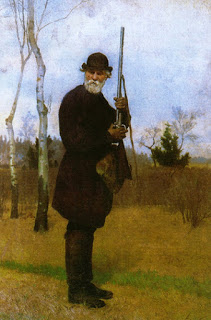I have been reading The Europeans by Orlando Figes
The book traces the story of the relationship between the writer, Ivan Turgenev, and the Spanish opera singer Pauline Viardot. Turgenov wrote that she was the only love of his life, and their relationship fluctuated between the very close to the quite distant over the course of many years.Figes’s book is very wide ranging, and those seeking an in depth look at Turgenev would probably be well advised to seek a dedicated biography. However reading it reminded me about the very strong reaction that Turgenev’s masterpiece, Fathers and Sons, attracted when it was published in the early 1860’s. Despite probably being his best known work and still a favourite of many today, at the time in Russia the novel pleased no-one. Radicals thought that he had made the nihilist Bazarov a caricature of a revolutionary, and the more conservative sided with the ‘fathers’ in the book in deploring his revolutionary views.
The resulting storm was instrumental in Turgenev’s decision to live largely outside Russia for twenty years. He complained in a letter to a friend that ‘mud had been slung at him from all sides’ and that he had been called ‘a judas, a fool, and a donkey’ and also ‘a police spy’.
In my talk The Art of Resistance I discuss Turgenev’s work. It is certainly the case that he writes objectively, but his liberal sympathies are, I think, quite clear. It has to be remembered that censorship was still alive and well in Russia at the time, and extreme expressions of liberal opinion would never have been published at all. It should also be borne in mind that Turgenev spent time in prison, and under house arrest on his country estate, due to police objections to an earlier work of the 1850’s.
Ivan Turgenev hunting (1879) by Nikolai Dmitriev-Orenburgsky (private collection)

